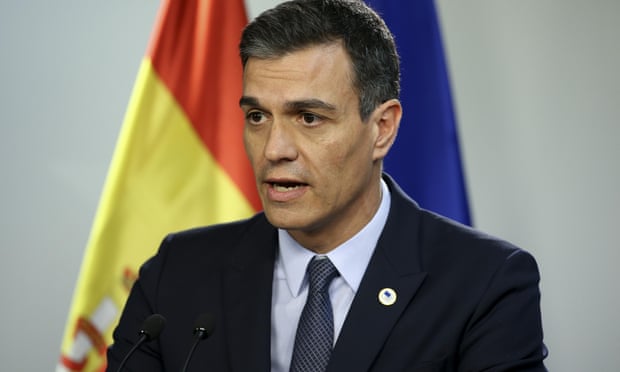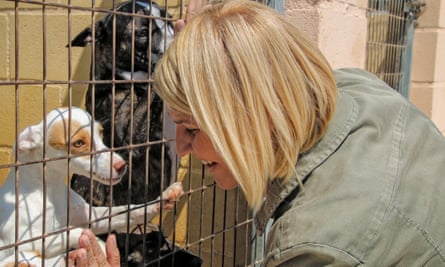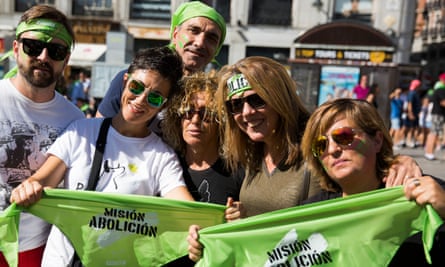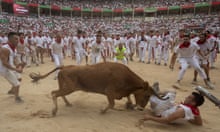If the polls and pundits are correct, Spain’s Vox party will achieve its much-prophesied breakthrough in Sunday’s general election, becoming the first far-right grouping to win more than a single seat in parliament since the country embarked on its post-Franco return to democracy.
Although Vox’s chances of attracting about 11% of the vote have hogged the headlines, another small party – and one with a markedly different worldview – is also gearing up for a historic day at the ballot box.
The animal rights party Pacma, founded 16 years ago to put an end to bullfighting, could win two seats in the congress of deputies, according to the most recent poll by the country’s Centre for Sociological Studies (CIS).
Quick GuideSpain general election
Show

Spain will go to the polls for the third time in under four years on 28 April after the country’s socialist prime minister Pedro Sánchez called a snap election.
Sánchez announced the vote after Catalan pro-independence parties joined right-wing parties in rejecting the government’s 2019 budget.
The Spanish Socialist Workers’ party (PSOE) has governed Spain since last June, when it used a vote of no-confidence to throw the corruption-mired, conservative People’s party (PP) out of office.
But Sánchez has struggled to achieve an ambitious agenda – including the exhumation of Franco – as he has headed a minority government, holding only 84 of the 350 seats in the Spanish congress.
The PSOE’s opponents accuse it of being weak and too reliant on the separatist Catalan parties that helped usher it into power.
Polls suggest that the PSOE will take the most votes but will fall short of a majority.
However, it could profit from the fragmentation of the Spanish right following the emergence of Vox.
The PP leader, Pablo Casado, has dragged the party much further to the right in the hope of seeing off the challenge from Vox.
The centre-right Citizens party has also shifted further to the right in recent months, and made the Catalan crisis a key focus. Its tough line on regional independence and rigorous defence of Spain’s national unity paid off in the 2017 Catalan regional elections, in which Citizens was the single biggest winner. Its leader, Albert Rivera, has vetoed a coalition with the PSOE, although many observers suspect he could rethink that position in the post-electoral horse-trading.
Podemos, which, like Citizens, achieved a breakthrough in the 2015 election, ending decades of PSOE and PP duopoly, has lost momentum in recent years. The anti-austerity party, born of frustration and the indignados movement, looked set to leapfrog the PSOE and become the dominant leftwing political force in the 2016 general election.
But mixed messages, internal rifts and an alliance with the United Left saw it do far worse than expected.
Podemos has helped to shore up the Sánchez government, but very public internal spats have blunted its message and weakened its image.-
Like Vox’s looming breakthrough, Pacma’s arrival in the arena of national politics would have been extraordinarily unlikely even a few years ago.
The Spanish environmental party Equo managed to win three seats in parliament in the 2015 general election, but only after joining the coalition led by the anti-austerity Podemos party.
Pacma’s leader, Silvia Barquero, attributes the party’s sudden momentum to years of hard work, demographic changes and a growing awareness of animal rights and environmentalism in Spain.
“More and more people are putting their trust in us as a political group,” she said. “If we manage to win two seats, we’d be making history in the country where bullfighting happens and where they still abandon and hang greyhounds. It’s such a damaging image for the country to have.”
Pacma, which opposes hunting and fishing for sport, also wants to see an end to circuses, aquatic shows and “the use of animals, whether alive or dead, in any kind of show, tradition or festival”.

Vox and the conservative People’s party (PP) have taken the opposite tack, signing up bullfighters and the widow of a torero killed in the ring three years ago as candidates, and seeking to portray themselves as the guardians of Spain’s rural traditions.
But Barquero believes more and more Spaniards are coming to reject bullfighting and “don’t feel able to identify with a country which sees it as a national celebration”.
She added: “There’s a new generation of people who are worried about animals and the environment and who have an understanding of social justice that goes far beyond what you see in Spanish politics at the moment.”
The party, which is also expected to win its first seats in the European parliament in next month’s elections, has increased its vote from 44,795 in 2004 to 286,702 in the 2016 general election. This time it is hoping to secure about half a million votes.
Barquero says Pacma’s second priority after animal welfare is protecting the environment and introducing “drastic and immediate measures” to tackle climate change.
She says there has never been a strong tradition of environmental parties in Spain, and argues that the Equo party was “totally neutralised” after joining forces with Podemos.
But she insists that environmental issues are too pressing to be ignored or approached with quick-fix political solutions.
“We need global measures that go well beyond the ridiculous local ones that political parties talk about during election campaigns,” she said.
“They’re only thinking about the next election – not about the consequences of their political decisions for the generations that will follow.”
For too long, she said, Spanish political parties had been seeking to make political capital out of the Catalan independence crisis and playing on “tensions and talk of borders and flags”.
“People are sick and tired of the political situation in Spain, which is going nowhere, and of the lack of authenticity from its politicians,” said Barquero.
“We’re sadly used to the idea that a politician says one thing and then does the opposite here. [But] there’s a new generation that’s completely in step with Pacma’s values. It’s young people between 18 and 35. Most of our voters are women in that age group.”

She said Pacma’s commitment to animal welfare and the environment was evident in the fact that its leaders and spokespeople were all vegans.
“We believe that meat production is one of the main threats to the planet when it comes to climate change – and we’re personally committed to doing something about it,” she said.
“That’s the best way to show we’re on the side of the environment and of people.”
Barquero says Pacma’s entire philosophy is based on empathy and minimising suffering and inequality.
The party is engaged in an internal debate about abortion and the point at which foetuses begin to feel pain.
“There’s no ethical debate about suffering when someone is just two cells, but there is when the foetus has the nerve stimuli to be able to feel and suffer,” she said.
“We’re very interested in knowing, scientifically, at what exact point that happens. For us, that’s where the limit should be and after which abortion should not be permitted. It’s ethically unacceptable.”
Barquero describes Pacma and Vox as complete opposites – “we’re as different as night and day” – but recognises that their existence will help voters make a clear choice on Sunday.
“More and more people don’t want to be associated with bullfighting and hunting, which, like the rest of what Vox is proposing, are part of our past. Vox has seen that we’re a threat and come along saying the exact opposite of what we’ve been saying: ‘We’ll defend hunting! We’ll defend bullfighting!’”
Polls suggest the ruling Spanish Socialist Workers’ party (PSOE) will win the most votes – 29.2% – but fall well short of a majority. The PP is forecast to take 20.1%, the centre-right Citizens 15.5%, Podemos 13.6%, and Vox 10.7%.
Barquero said her party would support “a progressive government” led by the PSOE, but that its backing would depend on the socialists considering Pacma’s proposals for ending the mistreatment of animals in Spain.
“I feel ashamed that people in other countries see Spain as the country of bullfighting – that needs to be wiped from the collective imagination as it’s doing us a lot of damage,” she said.








